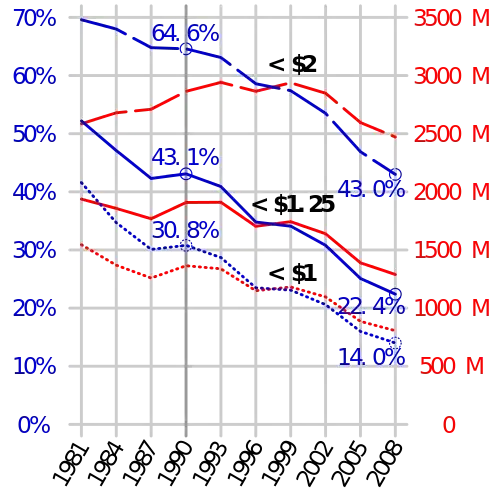Halving extreme poverty from 1990 to 2015 is the #1 Millenium Development Goal (and the Sustainable development goals aim to eradicate it completely by 2030). Specifically, target 1A for the MDG is:
Target 1A: Halve, between 1990 and 2015, the proportion of people living on less than $1.25 a day
This means US$1.25 in 2005 prices or, equivalently, $1.00 in 1996 prices.
Progress to this target is significant in most of the world. According to World Bank figures, the number of people living from less than $1.25 per day has dropped significantly, both in relative and in absolute terms. The figure below is from Wikimedia Commons, based on data from the World Bank:

Figure source: Wikimedia Commons
Graph of global population living on under 1, 1.25 and 2 equivalent of 2005 US dollars a day (red) and as a proportion of world population (blue) from 1981 to 2008 based on data from The World Bank
The figure shows that the fraction of the world population living of less than $1.15/day has dropped from more than 50% in 1981, to 22.4% in 2008. I don't know what model or baseline Hickel used, but the claim that it will take 100 years seems inconsistent with trends up to 2008.
However, the figure also shows that the trend for the absolute number of people living from less than $2/day is not as clear as the trend for the lower treshholds. So, this data neither contradicts nor confirms his claim that the number of people living off less than $5/day is increasing by more than 1 billion people.
The World Bank data above go only up to 2008. A more recent UN MDG report notes that the number of people living of less than $1.25 per day was 1.2 billion in 2008, 1.0 billion in 2011, and a projected 840 million in 2015. So, no support for Hickels claim here either, although again there are no figures for the number of people living of less than $5 per day.
There are, of course, other ways to measure poverty. In an article here, Hickel claims (among many other things) that the UN definition is flawed and that other definitions paint a less optimistic picture.
Sources:
See also:
